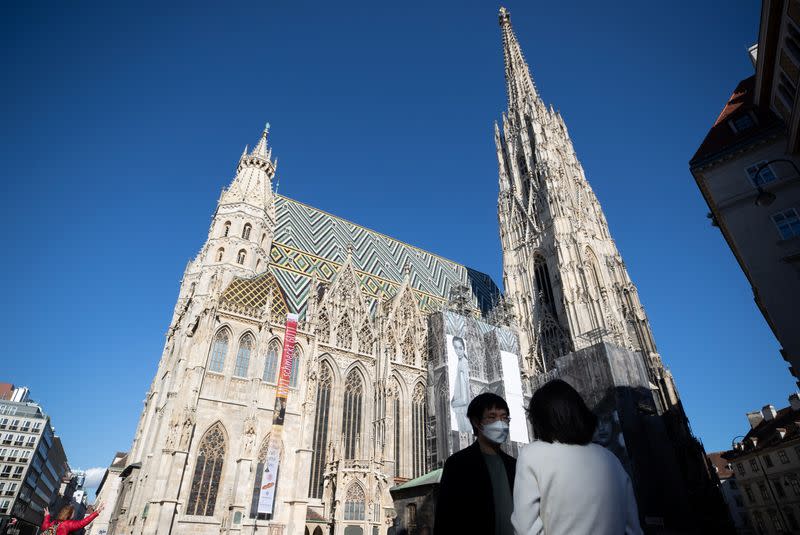Austria launches coronavirus aid, ready to help support companies
By Francois Murphy
VIENNA (Reuters) - Austria is making 4 billion euros ($4.4 billion) immediately available to deal with the economic fallout from the coronavirus pandemic, the conservative-led government said on Saturday as it ditched a central pledge to balance its budget.
The government is ready to provide more financial resources to keep companies afloat, Chancellor Sebastian Kurz said.
Austria has closed its borders to most arrivals from neighbouring Switzerland and Italy because of the coronavirus outbreaks there and is in the process of implementing measures to slow the disease's spread, shutting schools and most shops other than those selling food and medicine from Monday.
"A balanced budget is always important, but Austrians' health, jobs and a stable economy is more important," Finance Minister Gernot Bluemel told a government news conference, referring to his and fellow conservative Chancellor Sebastian Kurz's top economic target.
The initial 4 billion euro "corona crisis fund" would cover items such as bridge loans and credit guarantees to shore up businesses' liquidity, Kurz said. Help with shortening working hours for staff and deferring taxes would also be provided.
Asked on ORF TV whether the government had a limit on financial aid, or whether it would provide as much money as necessary, the chancellor said: "There is no limit to what is necessary. In this respect, everything possible is being done to secure the economy, and the jobs in Austria."
The government had the big ambition to maintain liquidity in the affected companies and to make sure that as many people as possible could keep their jobs, Kurz said.
Bluemel is due to give a budget speech on Wednesday. He said that instead of focussing on balancing the books his budget would spell out "the bitter truth of this crisis", and be aimed primarily at helping the country overcome it.
In the past, Bluemel and his party have opposed any move towards more flexibility on the European Union's deficit rules.
In January, the month in which Bluemel's conservatives struck a coalition deal with the Greens and returned to power, he said he opposed any loosening of those EU budget rules, even to enable spending on climate measures.
But in light of the coronavirus pandemic the European Commission, which enforces those rules, has said it will give member states flexibility on budget deficits and state aid.
Austria has had 602 confirmed coronavirus cases and one death so far, and the disease is spreading fast. Italy, across the border, has more than 17,000 cases and 1,200 deaths.
The disease first reached Austria from Italy, and the mountainous west of the country wedged between Italy and Germany has been hardest hit. The ski resort of St Anton am Arlberg and the whole valley of another top resort, Ischgl, were put under quarantine on Friday because of clusters there.
Hundreds of Norwegian and Danish tourists were infected in a bar in Ischgl, where a bar keeper had carried the virus, local Austrian media reported.
Another resort town, Heiligenblut, was put under quarantine on Saturday. Anyone who has been to those towns since Feb. 28 or has been in contact with those people must self-isolate for 14 days, Kurz said.
(Reporting by Francois Murphy, Additional reporting by Kirsti Knolle,; Editing by Edmund Blair, Kirsten Donovan, Frances Kerry, William Maclean)

 Yahoo Finance
Yahoo Finance 

